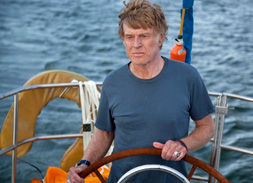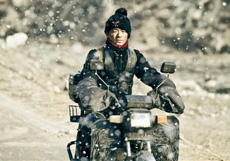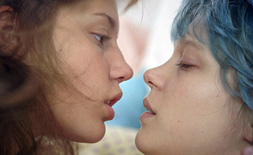

We could never have loved the earth so well if we had had no childhood in it.
~George Eliot, The Mill on the Floss, 1860
The anthropology of childhood is a relatively new field for anthropological study that has, in recent years, set about to explore the questions of whether childhood is a cultural universal, the role of children in society, their perspectives on, and participation in, the social world, and the degree to which family and community is structured around them.
In The Story of Children and Film, highly-regarded Irish documentarian Mark Cousins employs his own family as a construct within which to explore the history of children in film — their stroppiness and authentic natures, as well as their reticence, reserve and innate inner strength, his anthropological cine-essay offering an entirely captivating, incredibly well-researched and insight-filled perspective on the history of children in cinema, with Cousins - in his role of interpreter and narrator of the events unfolding on screen - acting throughout as a noble evangelist for the cause of humanist cinema.
Among the 53 films from 25 nations Cousins excerpts, the standouts are Jafar Panahi’s 1995 The White Balloon from Iran, Danish director Astrid Henning-Jensen’s 1949 short Pelle Alone in the World, François Truffaut’s The 400 Blows, Luis Buñuel’s Los olvidados, Charles Laughton’s The Night of the Hunter, Russian Sergei Bodrov’s 1989 Freedom Is Paradise, J. Lee Thompson’s London-set 1953 film The Yellow Balloon, Charlie Chaplin’s The Kid and Steven Spielberg’s E.T.: The Extra-Terrestrial, although there is this one extended scene in a film the title of which eludes me, with a close-up on a young boy’s face, that is absolutely heart-wrenching.
Even at this early point in the Festival, VanRamblings believes that The Story of Children and Film will prove to be among the strongest documentaries to screen at VIFF 2013 — the audience with whom we experienced the film were completely in thrall, the film all but guaranteed a spot in the top five docs to screen in 2013 edition of our Festival by the sea. VanRamblings is awarding the film an A grade, and enthusiastically recommends you take in one of the two final screenings of the film, both times at The Cinematheque, on either Saturday, October 5th at 4:45pm, or on the following Wednesday, October 9th, at 7pm.
Perhaps the only misstep in Cousins’ erudite anthropological analysis arises when he suggests that literature has failed to capture the experience of childhood, when in fact George Eliot, some 150 years ago, did so with keen and often heart-rending insight, as is revealed in this moving passage …
Very trivial, perhaps, this anguish seems to weather-worn mortals who have to think of Christmas bills, dead loves and broken friendships, but it was not less bitter to Maggie - perhaps it was even more bitter - than what we are fond of calling antithetically the real troubles of mature life. ‘Ah, my child, you will have real troubles to fret about by and by’ is the consolation we have almost all of us had administered to us in our childhood, and have repeated to other children since we have been grown up. We have all of us sobbed so piteously standing with tiny bare legs above our little socks, when we lost sight of our mother or nurse in some strange place; but we can no longer recall the poignancy of that moment till we weep over it, as we do over the remembered sufferings of five or ten years ago. Every one of those keen moments has left its trace and lives in us still, but such traces have blended themselves irrecoverably with the firmer texture of our youth; and so it comes that we can look on at the troubles of our children with a smiling disbelief in the reality of their pain. Is there any one who can recover the experience of his childhood, not merely with a memory of what he did and what happened to him, of what he liked and disliked when he was in frock and trousers, but with an intimate penetration, a revived consciousness of what he felt then – when it was so long from one Midsummer to another? - what he felt when his schoolfellows shut him out of their game because he would pitch the ball wrong out of mere wilfulness; or on a rainy day in the holidays when he didn’t know how to amuse himself and fell from idleness into mischief, from mischief into defiance, and from defiance into sulkiness; or when his mother absolutely refused to let him have a tailed coat that ‘half,’ although every other boy of his age had gone into tails already? Surely if we could recall that early bitterness, and the dim guesses, the strangely perspectiveless conception of life that gave the bitterness its intensity, we should not pooh-pooh the griefs of our children.
— George Eliot, The Mill on the Floss (1860), Book One, Chapter 7
VanRamblings will conclude today’s VIFF 2013 post by offering recent video of luminous screen performances by children, first from Australian actress Mia Wasikowska, whose role as Sophie in the first season of HBO’s In Treatment represents one of the most incandescent childhood performances captured on screen this past decade.
Next, Canada’s 2011 Foreign Language Oscar nominee, Monsieur Lazhar …
And, finally, arising from her Genie award-winning Best Actress performance, the expressive heart of Monsieur Lazhar, Sophie Nélisse, who this November will star in this - still, as yet - under the radar Fox Studios adaptation of Markus Zusak’s international best-seller, The Book Thief (note: as the narration in the trailer is terrible, you’ll have to look beyond to Sophie Nélisse’s tough, strong-minded performance) …
The Book Thief: something to look forward to this mid-November.
![]()
![]()
![]()
VanRamblings’ pre-and-early coverage of the Festival was expansive. If you haven’t glanced through this past week’s posts, here are some links …
- For those of you who did not catch our Monday introductory VIFF 2013 post, just click here.
- Parts 1, 2 and 3 of our ‘best bets” posts are here, here and here.
- The titles, and more, of the 15 films shared by the New York and Vancouver Film Festivals may be found here.
- The VIFF’s calendar schedule is located here (you’ll need to put in the correct date).
- The search engine for VIFF 2013 films may be found here.
Enjoy your Festival, keep rested, and c’mon back to VanRamblings for more of our 32nd annual Vancouver International Film Festival buzz each day.





